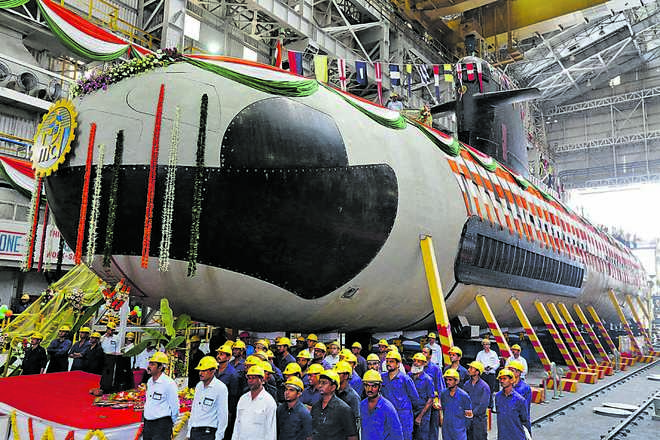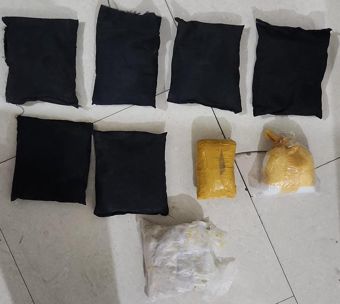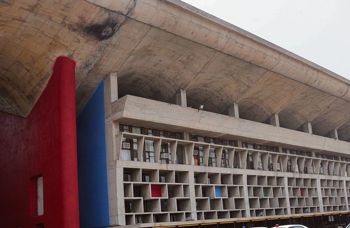
Employees of the Mazgaon ship-building yard gather around the first Scorpene submarine before it was floated for sea trials in Mumbai last year. AFP.
Sandeep Dikshit
The leak of 22,000 pages of detailed operational data about the future backbone of India's naval armada might on the surface appear to be a huge embarrassment for the Ministry of Defence. It hardly compares with the purloining of 7,000 pages of Indian Navy's future build-up plans exactly a decade ago.
While we wring our hands over the leakage and try to find the source, it is the right time to ask about the way tax payers' money is handed out to defence companies. News reports state that the first of the six Scorpene submarines will take to the waters towards the end of this year. But had the French been held to their word, it should have been fully operational in 2012 and the last and the sixth submarine in 2017. Damage to India's capabilities has taken place more because of the delay rather than the leakage.
The French smelt of roses and exuded agreeability when they were the frontrunners for the contract in 2005. The then Chairman of the company, Jean-Marie Poimbeuf even talked up the possibility of exporting them: “Our strategy is not only to be in India for developing products for India but to develop for others because we think that a submarine is a strategic defence system which a lot of navies are interested in developing.” He had then indicated Malaysia, Thailand and Indonesia as potential markets.
The CEO's promise added weight to the French offer and strengthened the Ministry of Defence's hand in scratching out Russian and German offers. Assurances apart, one can legitimately ask whether the French company plans to export even an Indian nail for the submarines it is building for other countries? Once the ink on the contract had dried, the French actually struck work at Mazgaon Docks, where the submarines were being built, when the Indians asked for indigenisation. It turned out that the assurance, “we will be very open to technology transfer,” was hot air as well. The French began insisting that tech transfers will cost extra. The company soon had its pound of flesh and today the Indian tax payer will pay at least Rs 7,000 crore more after accounting for the slide of the rupee vis-à-vis the dollar.
India has been unlucky to be caught several times in the vicious games played between defence companies. The most famous was the infamous Bofors case. Another one with instant recall was the deal with AgustaWestland to buy helicopters for ferrying top politicians in extraordinary comfort and security. A German company's project to build submarines was so badly sabotaged that it had to stop work after building just two submarines. The company, HDW, was later exonerated by the courts. But like Bofors and Agusta, despite building an excellent product, its brand-value was damaged beyond repair in India.
This time geopolitics may have played a part. Japan under a Narendra Modi-like Prime Minister was gung-ho about fencing in China. He found willing allies in former Australian Prime Minister Tony Abott and aggressive American naval commanders. With Modi coming to power, they had revived plans for a “quartet” which meant a US-India-Australia-Japan alliance to push back China that was being egged upon by its military and nationalist leaders in its maritime disputes in South China Sea and East China Sea.
In this background, Australia planned to produce a dozen submarines. Two Japanese companies and one each from France and Germany were shortlisted. American equipment suppliers for the submarines felt comfortable doing business with Japanese Keiretsus. The China-baiting Abott was dethroned by Malcolm Turnbull. Within weeks of taking over as Australian Prime Minister, Turnbull pencilled China as his first overseas destination. Naturally, geopolitics dictated that having made a friendly overture to China, Turnbull couldn't have handed over the submarine contract to Beijing's arch competitor in East China Sea, Japan.
Arms contracts are so lucrative, from providing employment to locals of the winning company to copycat orders from other countries, the loser tries every trick in the book to ensure it gets cancelled. That is how several defence contracts in India, including replacements for Bofors artillery guns, have been repeatedly scratched out. One frontrunner Denel, a quasi-public sector undertaking from South Africa, that would have suited India politically because of its ownership structure and New Delhi's close ties with the ruling African National Congress (ANC), was thrown out of contention on the basis of a few flimsy pages of documents that actually revealed nothing.
The purpose behind the leakage may have been to influence Australian opinion about the inability of the French consortium to hold on to secrets about their products. This may explain an Australian daily as the recipient of the leakage.
It is natural to reflect on the damage to India's naval operational plans because every conceivable detail about the submarine is out in the open — its diving depths, range, endurance and noise levels at various speeds. There is no doubt that Indian mariners and French engineers have several months of sleepless nights ahead. But Scorpene submarines are unlike the Russian Sukhoi-30 MKI that was exclusively supplied to India. Even Pakistan has a few of these boats in its inventory. Basically it belongs to a class known as diesel-electric and hundreds of these variants have taken to the oceans. The general characteristics about the noise it emits, the diving depth and the range of its missiles and torpedoes are generally known. The added re-tinkering following the exposure will certainly mean considerable retooling. But now is not the time to cry over spilt milk because very little has been actually spilt. Rather, with a French contract for fighter planes being negotiated, it is time for Paris to be reminded of their past unmet promises.



























